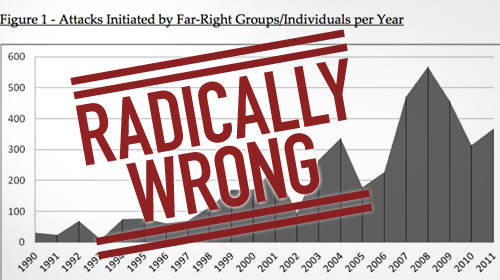Radically Wrong: Misstated Threats - Terrorism isn’t an American-Muslim Problem


Despite evidence to the contrary, the government continues to embrace a theory that adopting radical ideas is a first step toward terrorist violence. Based on this discredited model, "preventive" policies are being pursued, resulting in discrimination, suspicionless surveillance of entire communities, and selective law enforcement against belief communities and political activists. The following is the second installment in the ACLU blog series "Radically Wrong," which highlights counterterrorism policies that are not only ineffective, but also undermine our constitutional rights.
None. Zero. That’s the number of fatalities or injuries from terrorist acts by American Muslims over the last two years, according to a recent report from the Triangle Center on Terrorism and Homeland Security. Here are some other numbers from the report worth noting: In the United States in 2012, there were nine “terrorist plots” by American Muslims—only one of which led to violence. Of those nine plots, only 14 suspects were indicted. Separately, six suspects were indicted for support of terrorism.
Terrorism is not a “Muslim” phenomenon. Indeed, last year, the author of the report called terrorism by American Muslims “a minuscule threat to public safety.” Yet far too many policymakers assume the opposite is true, and too many policies are predicated on the false and bigoted assumption that Muslims are more likely to engage in terrorism than other Americans. The numbers above show how false the premise is. So why are we willing to undermine civil liberties, target an entire religious community, and devote countless resources to this “minuscule threat?”
The answer: a widely debunked “theory” on describing the “process” that drives people to become terrorists. This “theory” is based on the mistaken notion that adopting “radical” ideas (which, under the theory, includes religious beliefs) is a dangerous first step toward committing terrorist acts. Countering terrorism, the thinking goes, begins with countering “radicalization.”
Although it’s been refuted, the “theory” continues to drive policy. Recent Congressional Research Service reports cite it, and the White House issued a plan to counter violent extremism based on it. While the White House deserves some credit for using more careful language and for emphasizing the need for community engagement, it still perpetuates the notion that “how individuals are radicalized to violence” is something we can and should study and understand. And the number of agencies, task forces, working groups, and committees across government that are engaged in the White House’s plan is, well, staggeringly high.
Not surprisingly, when flawed theory drives policy, implementation of the policy is flawed too. If counterterrorism officials believe that adopting radical beliefs is a necessary first stage to terrorism, they will obviously target religious communities and political activists with their enforcement measures.
Take for example, the practice of “preventive policing” by which law enforcement doesn’t focus on crime, but rather tracks legal activities. It has a real and negative impact on individuals: the FBI conducts “assessments” or uses informants, conducts interviews, and surveils people based on their ideas or religious beliefs, or whether they are a certain religion, race, or ethnicity rather than information suggesting they might be involved in criminal activity. Preventive policing also affects entire communities. Through “domain management,” the FBI monitors and tracks entire religious, ethnic, and racial communities based on false stereotypes that ascribe certain types of crimes to entire minority communities. Targeted groups include Muslim- and Arab-Americans in Michigan, and also African-Americans in Georgia, Chinese- and Russian-Americans in California, and broad swaths of Latino-American communities in multiple states.
The FBI has increasingly relied on another tactic based on this flawed theory: the agent provocateur. Remarkably, most of the nine terrorist plots carried out by American Muslims uncovered in 2012 involved informants and undercover agents. According to a recent investigation, undercover agents and informants have targeted “Muslims who espouse radical beliefs, are vocal about their disapproval of American foreign policy, or have expressed sympathy for international terrorist groups”—otherwise known as First Amendment-protected activity. The investigation shows that these targets are fairly unsophisticated and “clearly pose little real threat” on their own. With all essential materials (like money and weapons) coming from government agents and informants, these plots are more manufactured by the government than interdicted.
It’s also clear that preventive policing won’t be tied to an empirical analysis of where significant violence occurs. According to West Point's Combating Terrorism Center, violent acts by far-right extremists significantly outnumber those by American Muslims, but have been virtually ignored by policy makers (though the report has its own problems). While there have been multiple congressional hearings on so-called radicalization of Muslims, there have been none on political violence emanating from the Far Right.
When we implement law enforcement practices that say those who hold “radical” political ideas or religious beliefs, for instance, are dangerous, we could all be in danger. What’s a “radical” idea or belief? It’s one that “reject[s] the status quo.” It’s not hard to imagine that almost all of us hold some “radical” beliefs, which is why it’s not surprising that so many groups come under government suspicion. Anti-government militiamen, misfit anarchists, PETA, Greenpeace, and the Catholic Worker have already been targeted. Who’s to say the group you belong to won’t be next.
Previous posts in the "Radically Wrong" series:
Part 1: A Counterproductive Approach to Counterterrorism
Part 3: The Right to Think Dangerous Thoughts
Learn more about religious discrimination and other civil liberty issues: Sign up for breaking news alerts, follow us on Twitter, and like us on Facebook.


